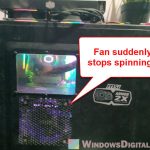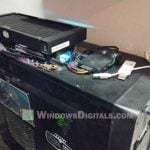I’ve had a problem where whenever I run a high-load app or play a very graphics-intensive game on one of my Windows PCs, it often starts making very weird and loud buzzing noises, so loud that sometimes I can’t bear. This isn’t just any fan sound or the usual noise from a working computer. It’s very specific, constant, and gets louder as the PC works harder.
At first, I thought maybe it was the fans, like a dusty case fan, the graphics card, or the fans in the CPU cooler. But after looking inside and listening carefully, I found that the noise was actually coming from the power supply unit (PSU). In this guide, I’ll show you a simple fix that worked for me and a few things you need to know about how to safely deal with a buzzing PSU.
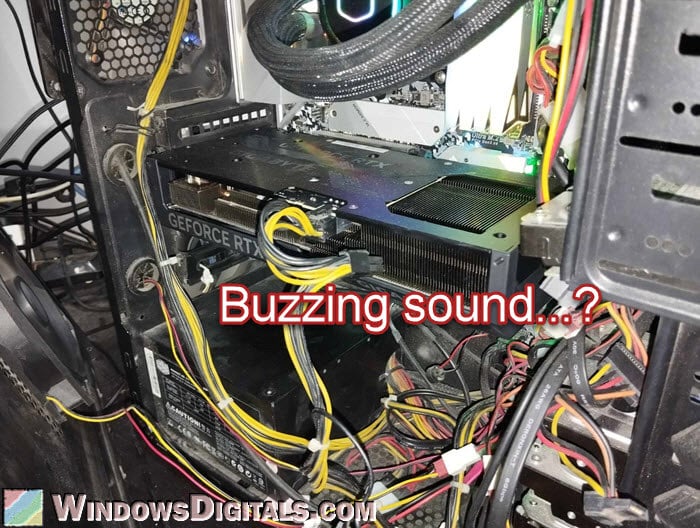
Page Contents
What I did – Simply tighten the PSU
To stop the buzzing from the PSU, I just had to make sure the power supply was tightly attached to the case. It turned out some screws had gotten loose over time, which let the PSU move a bit and vibrate, causing the buzzing sound. After turning off the power completely, I just tightened the screws that connect the PSU to the case. And that actually stopped the buzzing, even when my PC is running intensively.
Also see: Computer Makes Clicking, Humming, or Screeching Sound
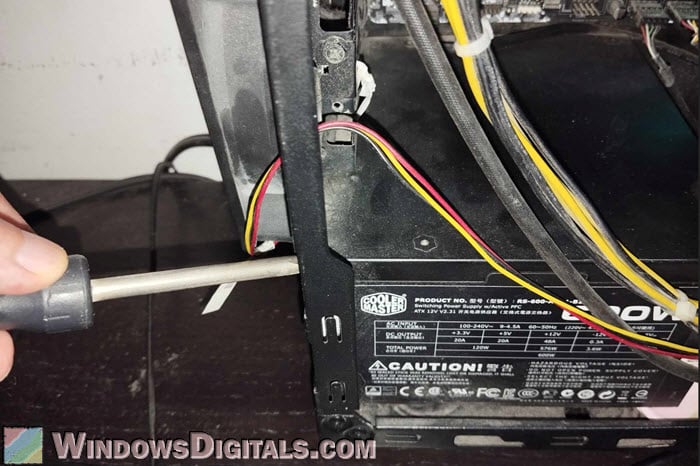
Some safety precautions if you’re trying to do the same
Before you make any changes inside your computer, especially to the PSU, make sure you’re aware of the following safety measures.
- Make sure your computer is off and unplugged from the wall. Press the power button a few times to let out any leftover power.
- Wear an anti-static wristband or keep touching a metal object that’s grounded to avoid static that could hurt your parts.
- You’ll probably only need a simple screwdriver, but make sure it’s the right size so you don’t mess up the screws.
- Don’t over-tighten the screws as it might damage the PSU casing or the threads on the case. Just make them snug.
- Check for any clear signs of damage to the PSU, like scorch marks, which could point to a bigger issue than just loose screws.
- After everything is secure, turn on your computer and listen for the buzzing sound. If it’s still there, you might need to look into it more.
If you’re not sure about handling hardware yourself, it’s always safer to get help from a pro instead, or just replace the power supply unit.
Related resource: How to Check Power Supply Wattage on Windows 11/10 PC
Coil whine in the Power Supply Unit
Coil whine is likely the most common reason for buzzing or whining noises in power supply units, especially when a lot of power is drawn from it. This noise happens because the electrical coils in the PSU vibrate when they react to changing currents and voltages needed by the computer’s parts. Coil whine is more obvious when you’re doing heavy tasks like gaming or rendering, which generally need more power.
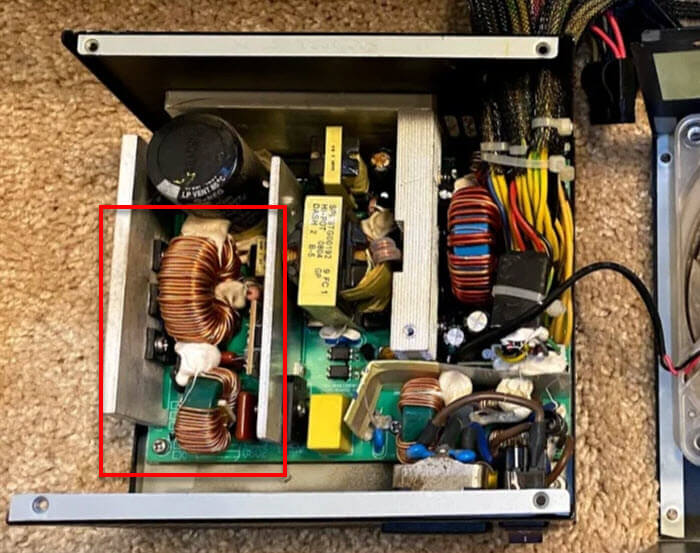
Although coil whine is usually harmless to the PSU or the computer, it can sometimes be very noticeable and bothersome. If you think coil whine is causing the noise, try the following suggestions.
- Make sure all parts, including the PSU, graphics card, and motherboard, are tightly fastened. Loose parts can make the noise even louder.
- Double-check that the noise is really coming from the PSU and not another part like the graphics card, which can also have coil whine (or other kind of noise).
- Changing the power management settings in the BIOS or system might help reduce coil whine by altering how power is spread to the parts (only for those who know what they’re doing).
- If the coil whine is bad and really bothers you while you work, maybe just get a new PSU that’s known for being quiet. Be sure to look for PSUs with high-quality parts and good noise level certifications.
It’s normal for some PSUs to have a bit of coil whine, and not all can be completely quiet under big loads. But if the noise is too much or comes with other problems like overheating or system crashes, you should check it out more or ask a pro for help.
Linked issue: Computer Fans Randomly Speed Up, Why?
Fan issues in the Power Supply Unit
The fan in the power supply unit (PSU) is very important for cooling the unit. But it can also be quite noisy, especially if it gets dusty or the bearings get really old (it happens).
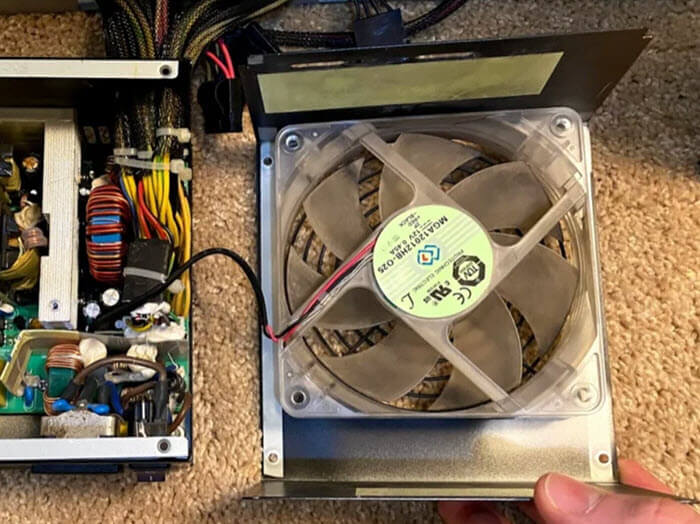
- Dust can slow down the fan and make noise. Try to clean your PSU’s fan from time to time with a compressed air can or something that can blow the dust out.
- Make sure that both the PSU and the computer case have good airflow. Bad air movement can make the PSU get too hot, which makes the fan run faster and noisier.
- As time goes on, the fan’s bearings might get old and noisy. If you hear grinding or rattling sounds, the bearings might already be going bad.
- If the fan is making too much noise and nothing you do can fix it, you might want to just get a new PSU instead. If you can remove the fan (usually, you can’t), you could just change the fan.
Other related problem: Computer Fan is Loud When Watching YouTube Videos
PSU too old or failing?
Over time, parts inside the power supply unit (PSU) can get old or stop working properly, which can make noises like buzzing or humming. Capacitors often go bad and can cause noise issues as they start to fail. Everything has a life span and nothing really lasts forever.
- If you can, look inside the PSU for any signs of problem like bulging or leaking capacitors. Note that you should never open the PSU case yourself unless you really know what you’re doing, because it can still be very dangerous even when unplugged.
- Listen if the noise changes in pitch or volume over time. A breaking part might get noisier as it gets worse.
- Think about how old your PSU is. If it’s been used for many years, parts inside might naturally start to wear out. PSUs usually last about 5-10 years, depending on how much they’re used and their quality.
- If you have another PSU or can borrow one, try swapping it to see if the noise is still there. This can help you figure out if the problem is really with your PSU or another part.
- If you think the PSU is failing, it’s usually cheaper to just replace it instead of trying to fix it. Go for a PSU with a solid warranty and good reviews to make sure it’s actually dependable.
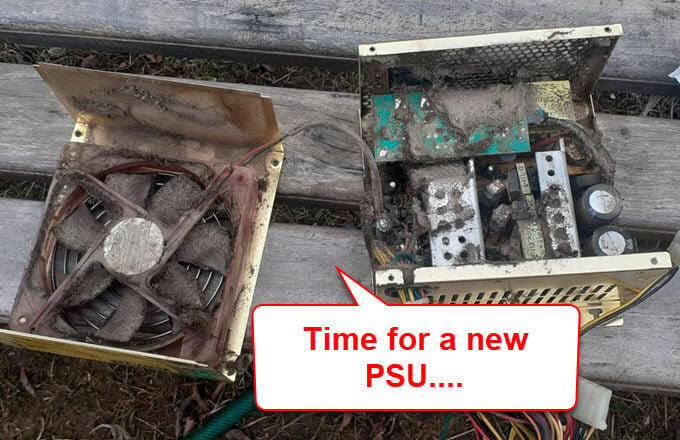
If your PSU has issues, you should sort it out or just replace it as soon as possible, because a failing power supply can cause your system to crash (with no warning), and you might even lose your data because of the crashes, or it might even hurt other computer parts.
